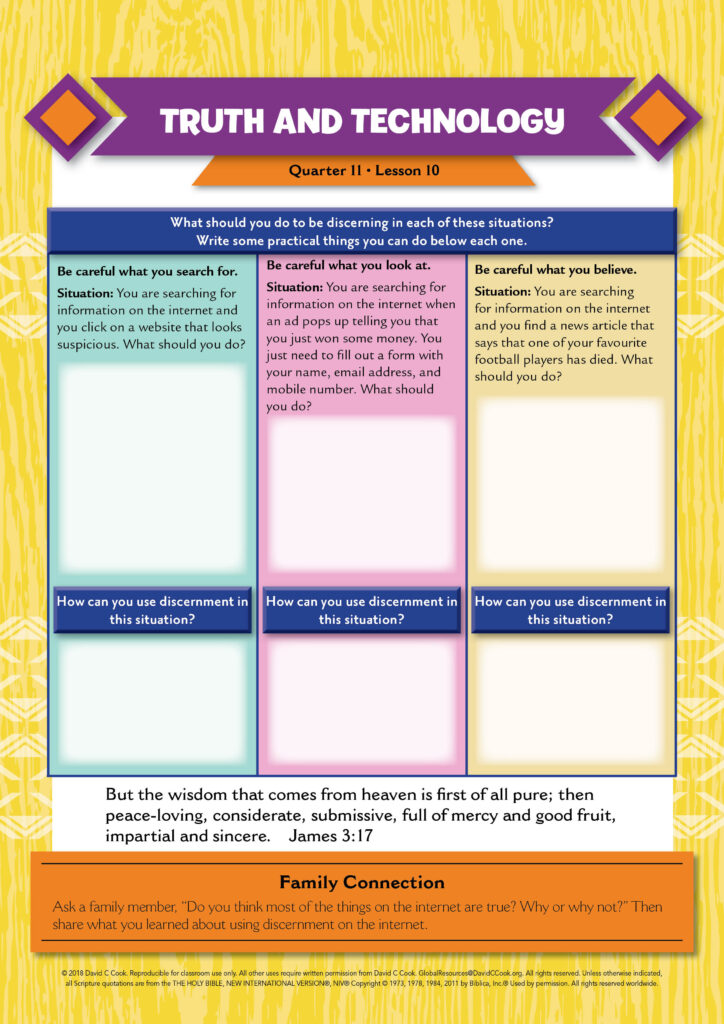During the lesson, the information for you to know is written in regular type, and what we suggest speaking or reading aloud to children is in bold. All resources for this lesson, including the Teacher Guide, Student Page, Family Connection Card, and other resources can be downloaded in a ZIP file by clicking on the following link:
In some lessons you will find "resource articles." These are articles written by experts from around the world to help equip you for your work with children and adolescents. Share them with parents or guardians if you consider it appropriate.
Turn my eyes away from worthless things; preserve my life according to your word.
Psalm 119:37
We often devote more time than we should to technology, and we often make ourselves more vulnerable than we should as we share information about ourselves through digital means. In our effort to learn new things, we may believe information that is untrue and allow it to shape our opinions and our interactions with others. In our effort to connect with others, we may harm our relationships and our self-image. We may even put ourselves in danger. Unfortunately, we are often blind to these risks, seeing only the attractions and temptations the internet offers.
Does your time on the internet and using your mobile phone bring value to your life? Or have your electronic devices become idols that keep you from seeing the life-giving things God has given you? Turn your eyes away from the digital world and focus instead on those around you and the One who created you. When your sight is set on God, you will not be tempted by worthless things. Instead, you will see only His ways, which are always true, always right, always good, and eternally valuable.
Encourage the students to ask their family members, “Do you think most of the things on the internet are true? Why or why not?” They can then share what you learned about using discernment on the internet.
Teacher Tip: If possible, email or text the Family Connection Card to the families of your students.
Greet the teens as they arrive. Ask them if they used the internet recently. Invite them to share what they did while they were online. Have them get into groups based on which of these uses for the internet their online activity fits into: communication, information, entertainment, or purchasing things. If they did not use the internet, ask them to decide which internet activity would be most helpful to them and join the appropriate group. They will work with these groups for the Connecting activity.
I am going to read a situation. After I read it, you will work with your group to decide who is telling the truth in the situation.
Give the students 3–4 minutes to decide which stranger is telling the truth. If necessary, give them a hint: they should try to think about all possible combinations of lying and telling the truth and eliminate the ones that are not possible. After a few minutes, allow 2–3 groups to share their explanations. Then share the answer:
The best way to figure out this problem is to think about all possible solutions.
Was it difficult for you to figure out who was telling the truth in this situation?
Why or why not?
Sometimes it is difficult to discover what is true. This is especially true of the things we find on the internet. I am going to share some statements with you that come from the internet. After I say each, raise your hand if you think what I said is true.
All of these things are all actually true. But much of what we read on the internet is not true. Unfortunately, false information is shared over and over again on the internet. When we read this information multiple times from multiple sources, we believe that it must be true.
Because technology provides us with so much information, both true and false, it is important that we learn to be discerning about what we believe and how we allow it to affect our opinions and our relationships with others. Today we will talk about how to use the internet with wisdom and discernment.
Allow 2–3 teens to share their answers to each of the following questions.
The internet provides us with information quickly and easily. Often, this is information we could not have gotten elsewhere because we do not have access to the experts or sources who shared the information online.
Unfortunately, some of the information we find online is false. Nearly anyone can start a website or post a blog to share information or opinions, and this information or opinion does not have to truthful or even well thought out.
With all of this information available, it is not easy to decide what is helpful and true, so we need to learn to be discerning. “Discernment” is judging carefully to find what is right and true, and this skill can help us to use the internet wisely. Listen to what the Bible teaches us about being discerning:
Folly brings joy to one who has no sense, but whoever has understanding keeps a straight course.
Proverbs 15:21
What do you think it means that “folly brings joy to one who has no sense?”
How could discernment help you to be a person of understanding who “keeps a straight course?”
Here are some things you can do to be discerning when you use the internet:
First, be careful what you search for. When you type words into the search bar in the internet browser, you are opening the door to a flood of information. And when you are not careful about the words you type, you may expose yourself to things you do not want to see. You may make yourself vulnerable to temptation or make your electronic device vulnerable to hacking. Use these tips to help you to search well:
Try to use words that accurately and specifically describe what you are looking for. Also, be careful to spell the words correctly.
Whenever possible, read the name of the website and the first part of the description before you click on a link in a list of search results. Do not click on links for websites that look suspicious or when the information does not seem to match what you searched for.
If possible, use a search filter. This setting will warn you when you click on a link that is suspicious or potentially dangerous.
Avoid clicking on advertisements. They may lead you to untrustworthy websites.
Check the website carefully to see if it looks genuine. Look for contact information for the organization that manages the website. Multiple spelling or grammar errors and strange spellings in the web address are also indications the website may not be reliable.
If you are suspicious about a site, do a search for the name of the website or organization and see what others have posted about it.
Look for trustworthy websites. These may be sites that are managed by reputable organizations or businesses that you recognize, sites that you have found to be reliable through your own experience, or sites that are secure (usually starting with https://).
Second, be careful what you look at. If you click on something and it is not what you expected, leave the website immediately. Do not click on other links on the page or read the information on it. If possible, clear your browser history and delete the cookies right away to avoid causing damage to your device. Cookies are data that the site may store as a way to identify you. Clearing your browser history and cookies may prevent you from seeing things that are harmful. It may also help to prevent pop-up ads and viruses.
Finally, be careful what you believe. Sometimes you will be exposed to things that are not true and right, especially on the internet. But you can do your best to find out what is true and decide carefully what you will allow to affect your opinions and your relationships with others.
Here are a few questions you can ask to make sure the information is true.
God is the source of all truth, and everything that is true brings glory to His name. We can look to God and His Word when we want to know what is true and right. Listen to what the Bible teaches us about this:
But the wisdom that comes from heaven is first of all pure; then peace-loving, considerate, submissive, full of mercy and good fruit, impartial and sincere.
James 3:17
Here is another question to ask yourself: Will this information or my new opinion or belief affect my relationships with others? If so, how?
People often have different opinions, and this can be good. But we should not allow our differences of opinion to cause arguments or disagreements. Listen to what the Bible tells us about this:
If it is possible, as far as it depends on you, live at peace with everyone.
Romans 12:18
Anytime we are unsure about what is truthful and right, we can ask God for wisdom. He is the source of all truth, and He will guide us to truth that reflects His ways.
Divide the teens into groups of 4–5. They will work with these groups for the rest of the lesson.
I will read some situations, and you will work with your group to use discernment and decide how to respond to each situation.
Situation: You are searching for information on the internet when an ad pops up telling you that you just won some money. You just need to fill out a form with your name, email address, and mobile number. What should you do?
Give the teens 2 minutes to discuss the situation. Then allow 2 groups to share their answers with the rest of the class. Repeat this process for each of the situations.
Optional: If you are using the Student Pages, the teens can do the activity on their pages.

In each of these situations, it was important to use discernment. God can give us guidance when we are not sure what to do. Listen again to the verse we read earlier:
If you are using the Memory Verse Poster, show it to the students.
But the wisdom that comes from heaven is first of all pure; then peace-loving, considerate, submissive, full of mercy and good fruit, impartial and sincere.
James 3:17

Choose 1 of the situations we just talked about. How could God’s wisdom help in this situation?
Give the teens 2 minutes to discuss this with their groups.
Now think of a situation in your own life where you can use discernment. It may be something that you have found on the internet or it may be another situation in your life where you need God’s wisdom. How can God’s wisdom help you in this situation?
Give the teens 2 minutes to think about their answers. They do not need to share their answers with their groups.
God is the source of all wisdom. If you ask Him, He will help you to discover what is true and right—on the internet and in other areas of your life.
Close with a blessing based on James 3:17:
Blessing: May you seek God’s wisdom as you use the internet, and may you be discerning in sharing the information you find, remembering that God’s truth is always pure, peace-loving, considerate, submissive, full of mercy, peaceable, gentle, reasonable, merciful, impartial,
and sincere.
Lead the teens in singing this quarter’s song, if possible.
Life on Life ©2020 David C Cook. Reproducible for home or classroom use only. All other uses require written permission from David C Cook [email protected]. All rights reserved.